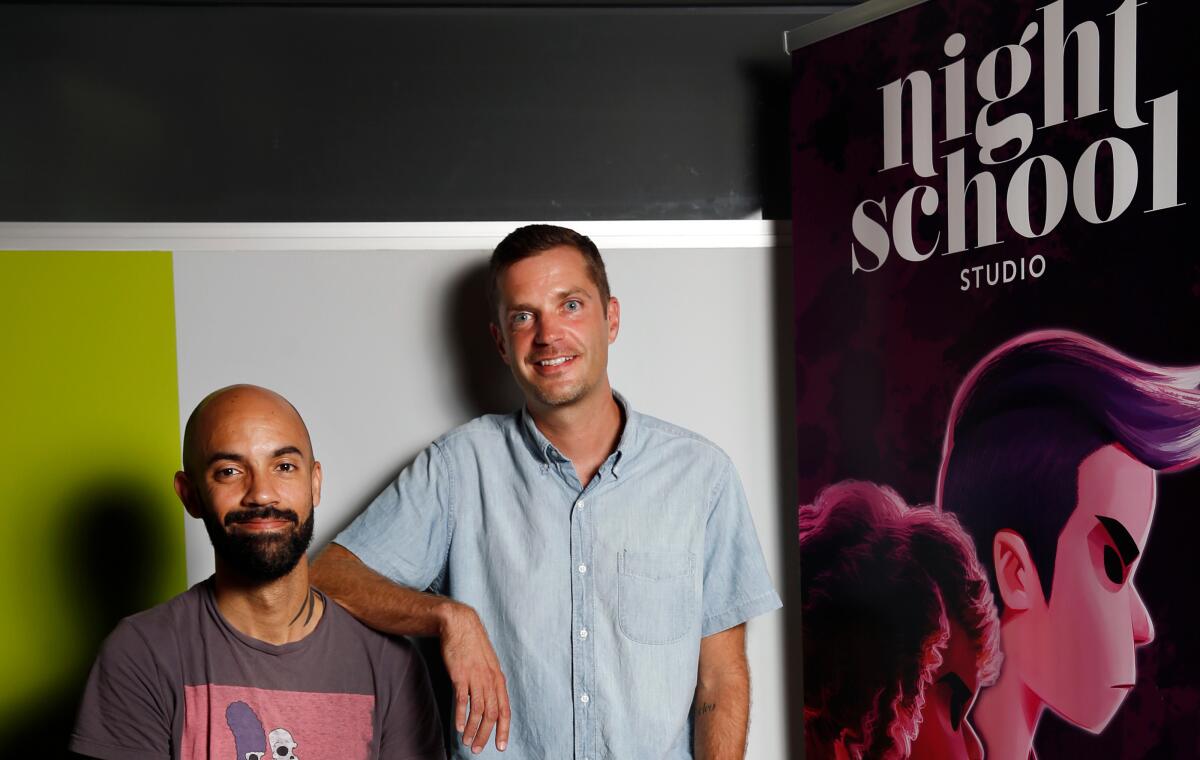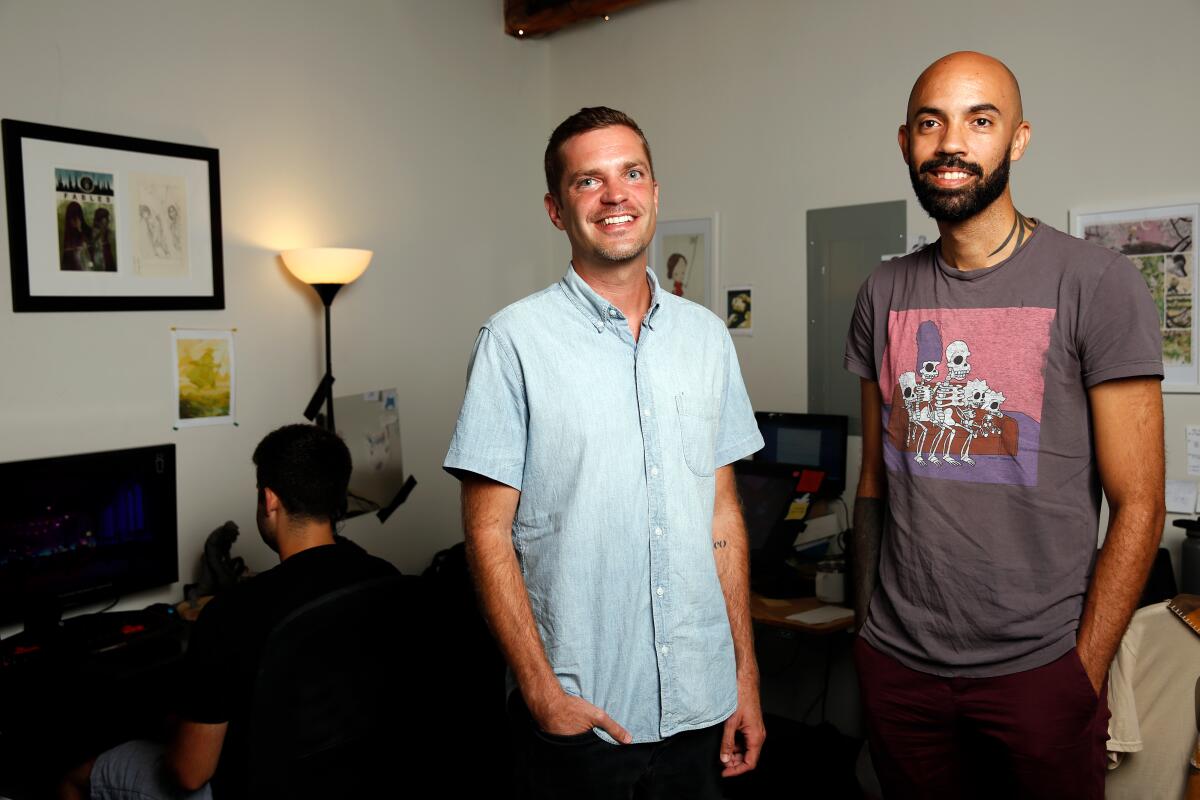The bad place: Go to hell in ‘Afterparty,’ Night School’s follow to hit game ‘Oxenfree’

- Share via
“Afterparty” was born during a walk through a cemetery.
Death. Sin. The Afterlife. The core ingredients of the narrative adventure came to Night School Studio co-founders Adam Hines and Sean Krankel during a casual stroll through Forest Lawn, a few blocks from their Glendale office. The game, their follow-up to “Oxenfree,” would be set in hell.
“What’s the zaniest location?” says Hines, sitting in the studio’s family room-like common area. “We were thinking about crazy medieval times things. We were thinking about post-apocalyptic things. We were thinking of different worlds where we could just have interesting characters. Then one of us said, ‘What if it’s the afterlife?’”
Inspiration then came from gravestones. “It’d be interesting if this guy who died in 1910 was sitting next to this 12-year-old who died recently. And it snowballed.”
Death, and hell in particular, proved to be a great equalizer, a place filled with the young and old and people from all walks of life and eras. Almost everyone, it turns out, has a little evil in them.
Like Night School’s “Oxenfree,” a game that presaged “Stranger Things” with its mix of teen comedy and light thrills — since its 2016 release it’s topped 1 million in sales — “Afterparty” will jumble the surreal and the real, its vision of hell not too dissimilar from the average college town. Bars are littered with obnoxious drinking games, and everyone is hiding something. One character you meet may be doomed to endless torture for being a cannibal, while another may be punished for repeatedly using the express checkout lanes at grocery stores despite having more than 15 items.
In turn, there are serious headgames burrowed into “Afterparty’s” humor. You’ll play as Lola, voiced by Janina Gavankar, and Milo, voiced by Khoi Dao, two recently deceased pals who can’t remember how they died and aren’t too pleased to learn they may not have been decent people. While they joke with one another, as well as their own personal demon, there’s a nagging question in the player’s mind: What if I’m playing as someone despicable? After all, we’re told Lola and Milo will be enjoying torture together, a fate, one demon tells us, usually reserved for those involved in murder-suicides.
But things never get too serious in “Afterparty.” Plenty are in hell on technicalities, and while it’s easy to recognize that someone who robs liquor stores is bad, some are doomed simply because of an arcane and ancient rule. The general idea, says Hines, is that everything ever written about hell is true, regardless of the faith or myth or where it originated. Such a broad view allows the game to sidestep potentially uncomfortable religious statements and to mix and and match lore at will. And the morals don’t get too heavy. One kid is in hell because he had the power to possess his toys.
Thatgamecompany helped launch the indie game movement with ‘Journey.’ Now ‘Sky’ aims to change the entire medium.
The model, says Krankel, was to have the player partake in a sort of interactive Pixar film, albeit one squarely aimed at adults. Krakel, Hines and the 12-person studio sought to hone realistic conversation patterns, with dialogue overlapping and interrupting while the player guides what the characters think and say.
“Post-’Oxenfree,’ we thought, ‘Why not do some crazy world-building?’” Krankel says. “In ‘Oxenfree,’ the world is pretty real and the events are not. In ‘Afterparty,’ the events and the world are just insane. There are aspects of it that are grounded because you still need to be connected at a human level, but we thought, ‘Can we make an R-rated Pixar world?’”
Due Oct. 29 for home computers as well as the PlayStation 4 and Xbox One (a Switch release will come later), “Afterparty” puts players on a multitiered quest. The main objective is to get out of hell, which can be accomplished by outdrinking Satan, which not so subtly makes real life something of a permanent hangover. Then there’s the matter of discovering how Milo and Lola ended up in hell. But goals, says Hines, may shift during the course of play, and the game may gently let players know when they picked a less-than-ideal path. Your personal demon, for instance, will regularly be taunting you.
When “Oxenfree” was released in 2016 it was part of a burgeoning independent movement that was reviving and tweaking the adventure games of yore, works such as “King’s Quest” and the “Monkey Island” games, which emphasized story and puzzles. At their best, those titles allowed players to discover the world by getting to know different characters, placing conversations at a premium. “Oxenfree’s” success was a proof of concept, and allowed Hines and Krankel to have the confidence to more aggressively push the exploration of interpersonal relationships in games.
“They are this single unit,” Krankel says of the game’s two leads. “Because of that, we can play with friendship, we can play with that mechanically and narratively. What does it mean to have a best friend your whole life and then go through all these difficulties? What’s the upside? What’s the stuff that gets unearthed? ‘Wait, you said that about me five years ago?’ There’s a lot of nice interplay between the two characters that ideally makes the player start to think about this friendship in ways that are probably similar to their friendships in real life.
“So even though this started with this ridiculous backdrop — party your way out of hell — once we got into the hell setting it was nice that the characters, the world and the themes could amplify basic human things but through ridiculous characters. “

Tonally, the two reference the films of Edgar Wright, especially “The World’s End,” as that particular work not only features a lot of booze — “We like going out drinking,” Hines says — but also looks at extended adolescence and learning how to be an adult, which are themes “Afterparty” aims to explore. If all goes according to plan, “Afterparty” will show the effects of alcohol, both its dangers as well as some of the absurd moments a bad night out can lead to. In terms of gameplay, drinks are something like potions, allowing players to use them to heighten various personalty traits.
Apple’s iTunes recognized a weakness of the mainstream music industry. Now Apple Arcade is disrupting gaming. A preview of the games to play
“If I’m playing beer pong against a particularly large and aggressive, frightening demon, and I got the most flirty drink in the world, am I going to throw him off by flirting with him while he’s shooting?” says Krankel by way of example. “It created not necessarily strategic choices, but flavor choices.”
And it allows “Afterparty” to use dialogue as a sort of weapon — and nod to the famed “insult sword fighting” from the “Monkey Island” series. Each bar becomes a level with mini-games to partake in.
“Some of them might be straight skill based, like a drinking stacking game,” says Krankel. “But others might be more about sweet-talking or having the right drink to insult somebody enough that they’re impressed. There’s a lot of effort that went into ensuring all these things can exist together and that we don’t ever have failed states.”
Ultimately, the game can be viewed as a grand metaphor. Of course beer pong is played in hell. Present, too, is hell’s very own social media network, where players can see other denizens of the afterlife tweet about their choices. And the game isn’t afraid to show players the demon that potentially lives inside all of us.
Get too drunk, says Hines, “and you’ll vomit up your conscience.”
“The conscience is a little character and you have to chase him around,” Hines says. “Until you get him back, every choice you have is awful, very selfish and narcissistic.”
'Afterparty'
Developer: Night School Studio
Platforms: PCs, PlayStation 4 and Xbox One (Switch release will come later)
ESRB rating: Not yet assigned
Release date: Oct. 29
More to Read
The biggest entertainment stories
Get our big stories about Hollywood, film, television, music, arts, culture and more right in your inbox as soon as they publish.
You may occasionally receive promotional content from the Los Angeles Times.











